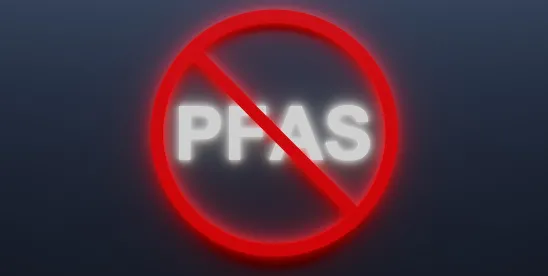2025 will be a landmark year in the regulation of per- and polyfluoroalkyl substances (“PFAS”), which have been nicknamed “forever chemicals” because of their persistence in the environment. For decades, PFAS have been used in all kinds of products (see table below). Addressing problems related to PFAS has been a federal priority since 2021, when the U.S. Environmental Protection Agency (“EPA”) published its “PFAS Roadmap” outlining a program of research, control, and cleanup. Most recently, the EPA adopted new reporting requirements covering all PFAS used in products since 2011, which are expected to affect 130,000 businesses. In 2025, EPA data-gathering programs will go into effect to determine where, when, and how PFAS have been and are currently being used. Thousands of facilities will also be required to submit reports on PFAS for the first time.
What’s Required?
The EPA has adopted new PFAS reporting requirements under two major data-gathering programs:
- Toxic Substances Control Act (“TSCA”) Retroactive Reporting to 2011. Requires a one-time report on all PFAS and PFAS-containing articles that have been manufactured or imported.
- Emergency Planning and Community Right-to-Know Act (“EPCRA”) Expanded Toxic Release Inventory (“TRI”) Reporting for 2024 and Later. Requires annual reports on the quantity, uses, releases, and disposal of PFAS.
Who Needs to Comply?
TSCA reporting requirements apply to any company that manufactured or imported PFAS or articles containing PFAS for use or sale in the United States. Because so many goods contain PFAS, all companies that manufacture or import goods should evaluate their products.
All companies required to report under the TRI program should determine whether PFAS reporting is required. Even if facilities don’t manufacture goods, PFAS are often used in manufacturing processes and equipment. EPCRA reporting requirements apply to facilities in specific sectors, including manufacturing, mining, electric utilities, energy, and waste treatment, storage and disposal.
When is Action Needed?
Companies should be taking steps now to ensure compliance. Determining whether new federal requirements apply could require investigation and inquiries to suppliers and contractors. Both the EPCRA TRI and TSCA reporting require detailed reports with extensive information on PFAS.
TRI reports under EPCRA are due on July 1, 2025 for the 2024 reporting year. TSCA reports for most companies will be due January 11, 2026. Qualified small businesses that only import goods and do not manufacture them have an additional six months to report (i.e., through July 11, 2026).
Some Products Known to Contain PFAS





 />i
/>i
